Lighthouses
MILAN BUDIMIR (1891-1975), FAMOUS SCIENTIST AND TRADITIONAL TEACHER
The Deepest Heartbeats of the Balkans
He went a long way from Mrkonjić Grad to resolving the most delicate pre-Antique mysteries of the Peninsula. He earned his doctorate degree in Vienna in Indo-European religion. He knew Andrić and Kočić, taught Gavrilo Princip, traveled with Nušić to Masarik’s birthday. Although he went blind before the age of 30, he set the foundations of Serbian Balkan Sciences and fortified classic philology. He despised ”any kind of mad running after Europe” and called upon the ”resurrection of the Balkan spirit and Balkan Homeland”
By: Đorđe M. Srbulović
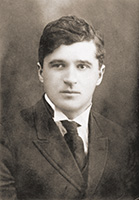 True knowledge, the one that separates a person from its contemporaries for centuries, has a feature of initiation. It implies that the Teacher, who possesses, develops and transfers it to others, must go through everything destined for him, but remaining upright in his Path. With it, he testifies Virtue and his life gains the magnificence that doesn’t end in his earthly life. The lives of Teachers last and multiply, transfer and continue in others, without the latter knowing whose life, whose deeds, thoughts and knowledge have been granted to them. Their task is to continue the Path, and those worthy of Learning do it. True knowledge, the one that separates a person from its contemporaries for centuries, has a feature of initiation. It implies that the Teacher, who possesses, develops and transfers it to others, must go through everything destined for him, but remaining upright in his Path. With it, he testifies Virtue and his life gains the magnificence that doesn’t end in his earthly life. The lives of Teachers last and multiply, transfer and continue in others, without the latter knowing whose life, whose deeds, thoughts and knowledge have been granted to them. Their task is to continue the Path, and those worthy of Learning do it.
All this is reflected in the life and work of Milan Budimir. Who would’ve known?! The beginnings were so unpromising on that November 2, 1891 in Mrkonjić Grad, homeland of Vrhovina, with Roman and Turkish roads, as he used to say. ”In the God forbidden land!” Mother 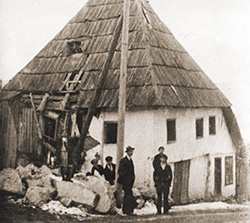 Jovanka, illiterate, honorable and traditional woman, father Đorđe, barber, merchant, inn owner, seller of traditional calendars and other books published by the ”Bookstore of M. Popović Brothers” in Novi Sad. These were the first encounters of Milan Budimir with books. According to his words, his father spoke the ijekavian dialect and his mother ikavian, so already in his home, he discovered different words, pronunciations and meanings. He attended the Serbian-Orthodox elementary school in Mrkonjić Grad, in the class of Pavle Ubavić, who later became senator. At the end of his life, in the early 1970s, in an interview to publicist Kosta Dimitrijević, Budimir said that he still knew the church songs he had learned then. Jovanka, illiterate, honorable and traditional woman, father Đorđe, barber, merchant, inn owner, seller of traditional calendars and other books published by the ”Bookstore of M. Popović Brothers” in Novi Sad. These were the first encounters of Milan Budimir with books. According to his words, his father spoke the ijekavian dialect and his mother ikavian, so already in his home, he discovered different words, pronunciations and meanings. He attended the Serbian-Orthodox elementary school in Mrkonjić Grad, in the class of Pavle Ubavić, who later became senator. At the end of his life, in the early 1970s, in an interview to publicist Kosta Dimitrijević, Budimir said that he still knew the church songs he had learned then.
He was a man of encyclopedic knowledge, a great erudite, always full of energy. (Nula dise sine linea. Not a single day without a line written. That sentence was his life motto and he often used to repeat it.) Joy was in the essence of his being – as Vojislav Đurić estimated the character of his professor.
CLAIRVOYANCE OF BLIND POETS
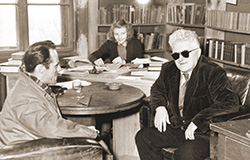 After the first four grades of elementary school, thanks to the municipality scholarship, he went to Sarajevo to continue his education in the classic gymnasium. He was good in languages, so already in junior high school he learned Greek and Latin, later Hebrew and several living languages: German, Hungarian, Russian, Italian, French… ”At the time I could read by myself, I read literature in twelve languages.” After the first four grades of elementary school, thanks to the municipality scholarship, he went to Sarajevo to continue his education in the classic gymnasium. He was good in languages, so already in junior high school he learned Greek and Latin, later Hebrew and several living languages: German, Hungarian, Russian, Italian, French… ”At the time I could read by myself, I read literature in twelve languages.”
By 1910, when he graduated from the gymnasium, he had become member of ”one of the many students’ associations, first Serbian, later Yugoslavian”. But not just any… He became member of the organization, which Božidar Purić named ”Young Bosnia” in Corfu Humorist in 1917! Budimir met the somewhat younger Gavrilo Princip, whom he held classes, as well as Gaćinović, for whom he said that only after his arrival the organization became serious and strong. Gaćinović was a real, born revolutionary; it is known that he used to meet Trotsky.
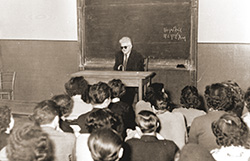 From 1910 to 1914, Budimir was in Vienna, studying classic philology and comparative linguistics. He was also active there, in students’ organizations ”Zora” and ”Akademac”. Due to his participation in the demonstrations against the ”dual monarchy”, he was in fifteen prisons. This ruined his health, so he went blind before the age of thirty. The hand of God: Budimir left more than 200 scientific works and studies of the blind poet Homer and his Iliad. He wrote most of them after going blind – at the same time opening the eyes of the entire world towards new paths of knowledge he had searched for, as well as towards the disappeared time, as academician Srejović used to say. This, along with many other things, took him to the very top of Serbian, European and world knowledge. At the end of his life, the work he wrote about the third blind great man – Filip Višnjić, will be the cause of Budimir’s persecution by Bosnian and Yugoslav communists. From 1910 to 1914, Budimir was in Vienna, studying classic philology and comparative linguistics. He was also active there, in students’ organizations ”Zora” and ”Akademac”. Due to his participation in the demonstrations against the ”dual monarchy”, he was in fifteen prisons. This ruined his health, so he went blind before the age of thirty. The hand of God: Budimir left more than 200 scientific works and studies of the blind poet Homer and his Iliad. He wrote most of them after going blind – at the same time opening the eyes of the entire world towards new paths of knowledge he had searched for, as well as towards the disappeared time, as academician Srejović used to say. This, along with many other things, took him to the very top of Serbian, European and world knowledge. At the end of his life, the work he wrote about the third blind great man – Filip Višnjić, will be the cause of Budimir’s persecution by Bosnian and Yugoslav communists.
Although the persecution additionally ruined his health, this man of joyful spirit stood tall. After a long illness, he died on October 17, 1975, without a commemoration, without the right to the Alley of Greats, without selected or collected works.
Even today he doesn’t have the place he deserves in Serbian culture. It is true that the famous Society of Ancient Studies in Belgrade grants the ”Milan Budimir” Award for Classic Sciences. The library of the Association of the Blind and one school for visually impaired carry his name. He was declared honorary citizen of Mrkonjić Grad, his birth town, in December 2012 and one street was named after him. However, all this wasn’t nearly enough or in accordance with the real importance of this scientific giant.
THUNDER GODS AND BALKAN FATES
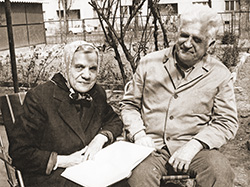 Due to his poor sight, he spent World War I in the logistics units, at an office desk. After the war had ended, he returned to Bosnia and started working, first in Bihać and then in the Sarajevo gymnasium. He started Novo Djelo, Oko, Slovenski Jug magazines. One of his closest associates – Cvijeta Cihler, doctor of biology, became his wife. (When professor Budimir lost his eye sight, his wife left her career completely and dedicated herself to his work and the family. It remained so even after she had lost her hearing, until her death in 1970.) Due to his poor sight, he spent World War I in the logistics units, at an office desk. After the war had ended, he returned to Bosnia and started working, first in Bihać and then in the Sarajevo gymnasium. He started Novo Djelo, Oko, Slovenski Jug magazines. One of his closest associates – Cvijeta Cihler, doctor of biology, became his wife. (When professor Budimir lost his eye sight, his wife left her career completely and dedicated herself to his work and the family. It remained so even after she had lost her hearing, until her death in 1970.)
In 1920, Milan Budimir, together with Branislav Nušić went to Tomas Masaryk’s 70th birthday celebration. On his way back, he went to Vienna, where he earned his doctorate degree, with professors Radermager and Von Arnim as mentors, with the thesis About Thunder Gods of Indo-European People. He taught at the Belgrade University since 1921.
At the time of Kingdom of Yugoslavia, during his participation in many international scientific meetings on Byzantium and philology, professor Budimir developed the consciousness about the need of scientific research of the entire Balkan area. When Ratko Parežanin (a great and unfortunately forcedly deleted name of Serbian culture) informed him about his idea to found the Balkan Institute, developed in his talks with his godfather Svetozar Spanaćević, Budimir immediately got involved in those activities together with Professor Petar Skoko from Zagr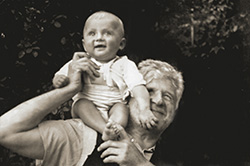 eb. Aware of the importance of the commenced work, King Alexander supported the work of this significant institution organizationally, financially and in every other way. The text of the program, entitled Balkan Fates, which Budimir wrote with professor Skoko, best shows the task of the Balkan institute: ”… so the entire civilization, both spiritual and material, created in the Balkans, would be criticized and formed not from the aspect of Western Europe, but from the aspect of the Balkan Homeland. Madly running after Europe and uncritically imitating it, as it has often been the case in the Balkans, excludes the revival of Balkan nations and resurrection of the Balkan spirit, since both can be achieved chiefly by contemporary cooperation of the Balkan humans, Balkan nations and Balkan states.” eb. Aware of the importance of the commenced work, King Alexander supported the work of this significant institution organizationally, financially and in every other way. The text of the program, entitled Balkan Fates, which Budimir wrote with professor Skoko, best shows the task of the Balkan institute: ”… so the entire civilization, both spiritual and material, created in the Balkans, would be criticized and formed not from the aspect of Western Europe, but from the aspect of the Balkan Homeland. Madly running after Europe and uncritically imitating it, as it has often been the case in the Balkans, excludes the revival of Balkan nations and resurrection of the Balkan spirit, since both can be achieved chiefly by contemporary cooperation of the Balkan humans, Balkan nations and Balkan states.”
The Balkan Institute gave a scientific view of the peninsula’s history, hardly noticeable up to then. The Balkans were no longer a synonym for backwardness and barbarism, but the Eastern Light, cradle of Europe and European civilization. The most important work the Institute published until the war, although the financing was stopped after the death of King Alexander (only a few months after founding), is certainly the two-volume Book on the Balkans, written by the greatest Balkan and European classic languages, archeology and history scientists of the time. Besides, also published were the book The Balkans and the Balkan People, and the monograph Belgrade, printed in several languages, which appeared at the Book Fair in 1940 but was never released, due to Germany’s opposition. Even today, this Belgrade guide is considered perhaps one of the best works ever written and printed about the Serbian capital. Furthermore, the Balkan Institute published four issues of the International Magazines of Balkan Studies until 1939. Even after World War II, in cooperation with other philologists from then Yugoslavia, Budimir started the scientific magazine Living Antiquity in Skopje, which he had given the name and interpretation of the name.
GUILTY FOR BEING AUTOCHTHONOUS
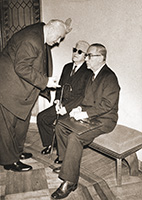 That is how Milan Budimir, together with Petar Skoko, Ratko Parežanin and other great scientists, founded Balkan Sciences in our lands. After the beginning of World War II and the occupation of the country, the Balkan Institute stopped working. In 1969, the Serbian Academy of Sciences and Arts Institute of Balkan Sciences was founded, but it was something different: the Balkan Institute was a mission. That is how Milan Budimir, together with Petar Skoko, Ratko Parežanin and other great scientists, founded Balkan Sciences in our lands. After the beginning of World War II and the occupation of the country, the Balkan Institute stopped working. In 1969, the Serbian Academy of Sciences and Arts Institute of Balkan Sciences was founded, but it was something different: the Balkan Institute was a mission.
Those familiar with the works of academician Milan Budimir, classify his voluminous scientific opus in their doctorate dissertations and scientific works in several wholes: philology and linguistics research of pre-antique tribes in the Balkans, Slavic lexicons (origins and primeval homeland of the Slavs), literary research. His textbooks, books and other works are seen as separate wholes. Above all this is the book-synthesis, perhaps the most important work of professor Budimir: From the Balkan Eastern Lights.
Milan Budimir was the first, long before computers proved his theories, who emphasized that the Iliad is the work of ”one man”, referring to the last two books, which other researchers used to neglect. Furthermore, searching for the Balkan pre-beginnings, Budimir came upon the pre-Hellenic natives, whom he called the Pelasts. ”European culture is a copy of the Roman, the Roman a copy of the Greek, and all this is a great mixture of the mixture”, he used to say. A blend of the existing and brought by the newcomers. Only the Balkan Slavs are autochthonous heirs of that great culture, because they are at their immediate source. ”Our language developed according to the Greek original, not according to the Latin copy.”
That is how Milan Budimir spoke, created, wrote, taught. The man who visited Laza Kostić at his deathbed, the man who associated and worked with members of ”Young Bosnia”, highly appreciated Andrić, Kočić (he knew them both personally) and Tesla. He acquaintance of the very top of Balkan and world science and boasted he knew ”two emperors – Bulgarian Boris and our Marko Car (Serbian: emperor)”, the writer.
We brought to the readers of National Review only crumbs of the story about Milan Budimir, wishing to renew the memory of this great man of science and culture, as well as to wake up something important, yet asleep within us, ”lost in time and space”. Professor Budimir doesn’t need it any more, but we do. We referred to the doctorate dissertation Milan Budimir as a Balkanologist written by Nebojša Radenković and the book of Kosta Dimitrijević Life Confessions.
***
Academies, Cathedras, Recognitions
Milan Budimir was a regular member of Serbian Academy of Sciences and Arts, and corresponding member of the Yugoslav Academy of Sciences and Arts and the Academy of Sciences and Arts in B&H. He was regular professor and for many years chief of the Classic Philology Department at the Belgrade Faculty of Philosophy, where he worked from 1921 until his retirement in 1962.
In 1964 he was awarded with the Belgrade ”October Award” and Medal of Labor with Red Flag, and in 1967 with the ”Seventh of July Award”.
***
Teacher
He was a teacher in the traditional sense of the word. Among his numerous students, we will mention only the most famous ones in the world of science: academicians Franjo Barišić, Milutin Garašanin, Slobodan Dušanić, Fanula Papazoglu, Vojislav Đurić, Dragoslav Srejović, Miron Flašar, university professors Momir Jović, Branko Gavela, Emilija Jovanović Mason, Radoslav Katičić, Ksenija Maricki Gađanski, Miroslava Mirković, Milena Milin, Miodrag Stojanović, Ninoslava Radošević, Radmila Šalabalić, Bojana Šijački Manević, metropolitan Amfilohije Radović, PhD, Ljiljana Crepajac, Ivan Gađanski...
***
Best Students
Among all his students, professor Budimir singled-out Ljiljana Crepajac and especially Miroslav Marković, who was professor at the Cambridge and later chief of the department in Illinois, USA. Although he had written more than a hundred books until the age of 50, Marković disappointed and betrayed his professor – as Budimir said – by agreeing to convert to Catholicism only to be able to advance at the American university.
|
